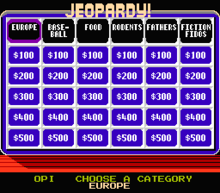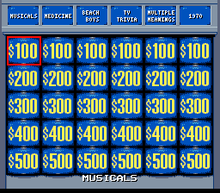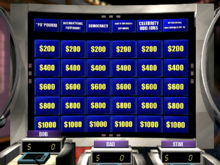- Jeopardy! in merchandising
-
Since the revival of Jeopardy! in 1984, the Jeopardy! brand has been used on products in various other formats.
Contents
Books
In 1990, host Alex Trebek co-authored The Jeopardy! Book along with Peter Barsocchini, which included boards from some of their past tournament games as well as boards specializing in some of the show's various categories. (Trebek also voiced the audiobook, which featured the "behind the scenes" material on tape one, and audio versions of select games from the book on tape two.) Its sequel The Jeopardy! Challenge, also co-authored by Trebek, along with creator Merv Griffin, included boards from their past tournament games, and was published in 1992.
In 2000, the show's writers released 4 volumes of quiz books titled Jeopardy!: What is Quiz Book 1-4?, each featuring more than 300 pages worth of Jeopardy! boards from Seasons 14-17.
In 2004, Barnes and Noble published This is Jeopardy!: Celebrating America's Favorite Quiz Show. Written by Ray Richmond, it featured selected Final Jeopardy! answers and questions from each of the show's first twenty seasons, plus trivia and other notable facts about the show.
A number of unauthorized books have been published about Jeopardy!, written by people with ties to the show: Inside Jeopardy!: What Really Goes on at TV's Top Quiz Show (1993), written by former Jeopardy! writer and producer Harry Eisenberg, was reissued in 1995 as Jeopardy!: A Revealing Look Inside TV's Top Quiz Show with several allegations of scandal removed; Secrets of the Jeopardy! Champions (1992), written by Tournament of Champions winners Chuck Forrest and Mark Lowenthal, and How to Get on Jeopardy! and Win! (1998), written by Tournament of Champions winner Michael Dupée, serve as preparation aids for the Jeopardy! contestant hopeful; and Brainiac: Adventures in the Curious, Competitive, Compulsive World of Trivia Buffs (2006), by 74-game winner Ken Jennings and Prisoner of Trebekistan: A Decade in Jeopardy! (2006), written by comedian and former contestant Bob Harris, provide the insights of the extensive Jeopardy! experiences of two other notable champions who subsequently became authors of several books each.
Video games
Jeopardy! has been adapted into several different versions of video games. Most versions released prior to 1998 were published by GameTek, which folded later that year.
Consoles
Milton Bradley made an eight-track cartridge version of the game for its Omni Entertainment System in the early 80s.
A version for the Nintendo Entertainment System first appeared in 1987, which supports up to three players (but not the NES Four Score accessory). Three modes of difficulty are available – easy, normal, and hard – with the amount of time allotted to give the correct question decreasing as the difficulty level increases. Because of the time period in which the game was released, the clues deal mostly with events of the 1980s based on issues in the United States.
The game was developed by Rare. A "Junior Edition", with more pop-culture questions and children as selectable characters, was released in 1988. A "25th-Anniversary Edition" appeared in 1990 with newer questions and was the last version made by Rare.
A version based on the 13-week ABC series Super Jeopardy! was released in 1991. The game was labeled a "talking" cartridge, which included speech samples that were heard periodically. This game utilizes a similar tournament format as the show, with the "Quarter-Final" game having four contestants instead of three (allowing for use of the NES Four Score accessory and/or a fourth NES controller). Subsequent "Semi-Final" and "Final" modes of play are locked until a prior mode is beaten and a special three-character code is entered.
Versions for the Super NES and Sega Genesis appeared in 1992. Although visually similar, they were developed by two different companies – Imagineering Productions for the SNES version, and Park Place Productions for the Genesis version. A "Sports Edition" was released in 1993, followed by a "Deluxe Edition" in 1994.
A version was released for the CD-i in 1995 and featured Charlie O'Donnell as announcer instead of Johnny Gilbert, and Sony Imagesoft released a version for the Sega CD with full-motion video and new questions in 1995.
A version was released for the Nintendo 64 in 1998, and was the last version made by GameTek as they filed for Chapter 11 bankruptcy protection that year. The Jeopardy! and Wheel of Fortune licenses were later acquired by Atari, then known as Hasbro Interactive.
Hasbro Interactive released two editions for the PlayStation in June 1998 and May 1999. In both editions, announcer Johnny Gilbert reads the clues instead of Alex Trebek. The second edition also featured a behind-the-scenes look at the show plus a sample contestant exam.
The PlayStation 2 edition was released in October 2003, however carried a 2004 copyright. It is the same game as Jeopardy! 2003 for the PC (see below), which was released in September 2002. An updated version was released for PlayStation 3 through the PlayStation Network on June 6, 2008. New features include online multiplayer games over the network and the capability for new games to be downloaded.
THQ acquired licenses from Sony Pictures Consumer Products to publish Jeopardy! and the sister program Wheel of Fortune for the Nintendo Wii and DS systems. Both Wii games are be compatible with the Wii Speak accessory. Both versions were released on November 2, 2010.[1]
Handhelds
Five different versions were released for the Game Boy – the original (1990), "Platinum Edition" (1993), "Sports Edition" (1993), and "Teen Tournament" (1996). None feature the likeness of Alex Trebek and can only support two players.
The original version and "Sports Edition" were ported to the Game Gear, featuring vibrant graphics and a somewhat-closer likeness of Alex Trebek, but still retained only being able to play with two players.
A version also appeared on Tiger Electronics' Game.com, and Tiger also manufactured two handheld versions in 1995 and 1999 (the latter being "Deluxe Edition"), with additional game cartridges sold separately.
In 2009, Sony Pictures Television released a version for the iPhone OS.
PC
Many different versions were made for the PC. The earliest came from Sharedata, with two versions plus "Sports Edition", "Junior Edition", and "25th-Anniversary Edition". Versions of these were also released for the Apple II and Commodore 64. Sharedata was later acquired by GameTek, who expanded their console game production into PC games.
Sony Imagesoft released their PC version along with the Sega CD version in 1995. Sports and TV question packs were also released by Sony Imagesoft's "Graphix Zone" division. When GameTek folded in 1998, Atari began making PC editions of Jeopardy! Three editions were made and are similar to the PS1/PS2 editions. The latest PC version was released in 2007.
"Plug And Play"
A handheld TV game version of Jeopardy! was released in 2007 by Jakks Pacific as part of their "Plug And Play" series of dedicated game consoles. The single unit features buzzer buttons for up to 3 live players, but allows for single- or two-player games as well. Much like the recent PC versions of the game, all responses are given from a multiple-choice list of four possible answers, thus eliminating the necessity of "typing in" answers a letter at a time like the older game console versions. this does affect gameplay, however, in making it easier to get the right answer as a random choice of four rather than actually knowing the right answer. Clues on these games have actually been used on the show.
Board games
- The earliest board game versions of Jeopardy! were produced by Milton Bradley from 1964 though 1976. Editions by Milton Bradley were numbered 1-12 and 14, skipping 13.
- Upon the popularity of the Trebek version, Pressman Toys marketed versions in the mid-1980s, and has once again started making home versions in the early 2000s. These include a version with electric signal devices and scoring consoles in 1987, an all-Simpsons version, and most recently an ESPN all-sports version (in both standard and "travel folio" versions), also with electronic buzz-in console. A Disney edition was planned for release in late 2008, but never materialized[citation needed].
- Tyco Toys produced two Masters' Editions in the early to mid-1990s with Alex Trebek featured on the box. Both Pressman and Tyco also produced Travel Editions.
- In 1999, Parker Brothers marketed a version as well.
Gameplay formats
Each of these home versions had its own unique gameplay format. The Milton Bradley and Pressman versions (both older and current) only had five categories in each round, allowed for the "emcee" (who acted as "banker") to choose where the Daily Doubles were placed, and used one of the higher Double Jeopardy! dollar values as the Final Jeopardy! clue instead of having a separate category/clue as on the show. In addition in the Pressman versions, players were spotted with $500 to start the game ($1,000 since 2003) and unlike the show, the scores couldn't go below zero; in the event that a player responded incorrectly and the clue was worth more money than they had, the player had to give all of their money back to the bank. As the rules stated, players could not have "negative dollar amounts" nor could they borrow money from another player or the bank. Also, there was a die to roll to determine who would go first in the Jeopardy! round, and in Double Jeopardy!, if two or more players tie for the least amount of money, they roll the die and the player who rolls the lowest number chooses first. In addition, there were 4 clickers to use to "buzz in"; if two or more players "buzz in" at the same time, they roll the die and the player who rolls the highest number gets to respond. Pressman's Travel Editions kept this format as well. Pressman also created an electric version of the game featuring three "buzz-in" and scoring consoles, each controlled by a 9-volt battery; the scoring was kept in hundreds of dollars, just like the play money in the other versions. In fact, this edition replaced the clickers and play money in previous and current versions with the consoles. An ESPN version also created by Pressman uses play money like the older and current versions, but utilizes a buzz-in console featuring 4 buzz-in buttons for the first 2 rounds, and a center button to activate a 35-second timer for Final Jeopardy! When one player buzzes in, all other players are locked out. Unlike the older and current versions, there is no game die to determine the selections; the oldest player goes first in the Jeopardy! round and also goes first in Double Jeopardy! if two or more players tie for the least amount of money. In addition, for each game, one of the $2,000 answers is marked "Final Jeopardy!" and is the last answer remaining and used in said round.
The TYCO versions went totally different from anything seen on TV, using six separate category stands that were distributed among the players, so that each player "hosted" one or more categories for each of their opponents and thus, played their opponents' category or categories. In addition, the cards used (which each had one Jeopardy! and one Double Jeopardy! category) had pre-selected Daily Doubles, so it was possible for more or less than the normal number of such clues in the appropriate rounds. In addition, Final Jeopardy! was played with a seventh separate card's $1,000 Double Jeopardy! clue.
Their Travel Edition used a single stand with the same-styled cards (allowing for interchanging of the game cards between the home and Travel versions) and similar gameplay.
The Parker Brothers edition is the only one to date whose play format accurately duplicated that of the TV show, with six categories in each round, pre-selected Daily Doubles (in the correct amounts; one for the Jeopardy! round and two for Double Jeopardy!) and a separate Final Jeopardy! category and clue.
Electronic games
Tiger Electronics released an electronic handheld game for Jeopardy! in 1995, and a Deluxe version came out in 1999, and both came with expansion cartridges and a booklet featuring answers and questions. If the booklet is used, the clue and responses will not scroll on screen and the players must turn to the page in the booklet for the clue and responses.
In 2002, in response to educators praising the longevity of the show's popularity and their students creating their own versions of the game to encourage student participation in class, educational toy company Educational Insights (which markets the Geosafari system) released a self-contained, programmable Jeopardy! game system that can be hooked up to a normal classroom TV for school use, titled Classroom Jeopardy!.[2] Following successful sales of Classroom Jeopardy!, a home version called Host Your Own Jeopardy! was released in 2004. Except for the names and included question content, both systems are identical, using a cartridge-based system for the categories and wireless remotes for the players and the host. The unit itself acts as the scoreboard. Earlier editions of the system included a small laptop-style keyboard that connected to the game unit and allowed for programming the cartridges. Later versions replaced this keyboard with a USB-connected device known as the "Classroom Jeopardy! Link", which allowed programming of the cartridges (and storage of unused games) via a PC or Macintosh (with included software). The Classroom edition featured one cartridge with 5 pre-programmed school-subject-based games; while the Host Your Own edition included four cartridges featuring 20 games used on the show, ranging from Kids Week level to Tournament Of Champions level. Educational Insights released an updated version of Classroom Jeopardy! in 2011.
In 2007, MGA Games released the Jeopardy! DVD Game system that includes 3 wireless buzzers and plug-in unit for your DVD player that keeps the score. Alex Trebek appears in the game and reads the clues. Video clues featuring the Jeopardy! Clue Crew also are included. (NOTE: This system is often used as a special giveaway at JEOPARDY! Clue Crew events.)
Other merchandise
For the show's 15th anniversary season in 1998-1999, a collectible watch was released. The watch plays the famous theme song with a push of a button, and included 25 game cards with the answer-question format. Despite poor sales, several watches are currently being auctioned and sold on eBay as of today.
A DVD titled Jeopardy!: An Inside Look at America's Favorite Quiz Show was released on November 8, 2005 and features five full episodes of the show: #1 (Trebek era premiere), #4657 (Ken Jennings' losing episode), #4781, #4782, and #4783 (the three finals games of the Ultimate Tournament of Champions, the latter of which can be viewed through multiple camera angles), and three featurettes: 21 Years of Answers & Questions, Jeopardy!: Behind the Answers, and What Does it Take to Get a Clue?[3] It also has some funny moments from the show, including Trebek doing the beginning of the first show of the Ultimate Tournament Of Champions Finals without trousers, and Johnny Gilbert mistaking Alex for a man who rehearses as Alex Trebek.
Every year, Day-to-Day Calendars' Andrews McMeel Publishing subsidiary releases a daily desktop Jeopardy! calendar, featuring 6 full games-worth of clues presented 1 clue per day (with the correct response on the back of each day's sheet).
The brand has also been licensed for slot machine games at casinos and online.
eBay set auctions
Shortly after the start of Season 19 in 2002, portions of the previous season's set were placed on eBay by Sony Pictures between December 8, 2002 and December 15, 2002, with auction proceeds donated to charities World Vision and the Motion Picture & Television Fund.[4] Some past contestants participated in the auction, including Bob Fleenor, who used some of his Jeopardy! winnings to buy a piece of the set.[5] College Champion Pam Mueller bought the rightmost podium.[6] Million Dollar Masters winner Brad Rutter was outbid for the leftmost (champion's) podium.[7]
References
- ^ http://www.amazon.com/dp/B003S2OO04
- ^ Richmond, Ray. This is Jeopardy!: Celebrating America's Favorite Quiz Show. New York: Barnes & Noble, 2004, page 210.
- ^ "Jeopardy!: An Inside Look at America's Favorite Quiz Show promotional web site". Sony Pictures Home Entertainment. 2005. http://www.sonypictures.com/homevideo/jeopardy-aninsidelookatamericasfavoritequizshow/. Retrieved 2006-12-10.
- ^ "FAMED JEOPARDY! SET TO BE OFFERED AS UNIQUE HOLIDAY GIFT ON EBAY THIS SEASON" (Press release). King World International Productions. 2002-12-09. http://www.kingworld.com/pr-Jeopardy-EBAY.htm. Retrieved 2007-01-26.
- ^ "J! Archive contestant page for Bob Fleenor". 2005. http://www.j-archive.com/showplayer.php?player_id=545. Retrieved 2007-01-26. "Some was used to buy a piece of the old Jeopardy! set in an eBay auction to benefit World Vision and The Motion Picture & Television Fund."
- ^ "Game Recap for Show #4729, 2005-03-10--Thursday, March 10, 2005 Game Recap and Discussion (SPOILERS)". Sony Pictures Message Boards. http://boards.sonypictures.com/boards/showthread.php?t=14622. Retrieved 2007-01-26. "It was a once-in-a-lifetime experience and a once-in-a-lifetime memento... It's at my mom's until I settle down. My old roommates, though, wanted to turn it into a wet bar."
- ^ Stacy, Mark. "MAKIN' A TOP 10 LIST (CHECKIN' IT TWICE) - TOP 10 JEOPARDY! MOMENTS OF 2002". Sony Pictures Message Boards. http://boards.sonypictures.com/boards/showthread.php?t=8625. Retrieved 2007-01-26.
External links
- The official website of JEOPARDY!
- The official website of CLASSROOM JEOPARDY!
- An authorized dealer for the CLASSROOM JEOPARDY! Game System
Jeopardy! Tournaments Other Versions Cast and Crew HostsAnnouncersOthersNotable References Miscellaneous Theme music · Audition process · List of contestants · Notable contestants · Broadcast history · Merchandising · WatsonCategories:- Game.com games
- Jeopardy!
- Video games based on game shows
Wikimedia Foundation. 2010.




